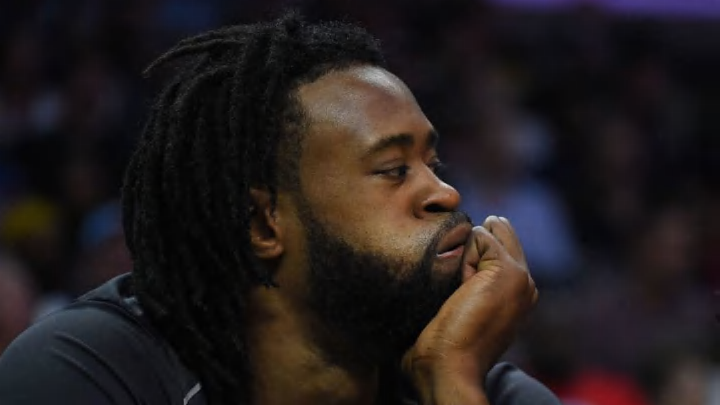In 2015, DeAndre Jordan reached a verbal agreement to join the Dallas Mavericks. Of course, as you probably know — after lots of emojis were tweeted, along with Paul Pierce tweeting out a JPEG of a rocket ship — Jordan returned to the Clippers. He spent the evening of July 8, 2015 “barricaded” in his home as he and his past and future Clipper teammates played cards and video games, eating food that his mother ordered for them, finally signing a contract that guaranteed he would remain with Los Angeles for at least three seasons.
Jordan’s next three years in Los Angeles were good; he made two All-NBA teams, including a first team nod, and the lone All Star Game of his career thus far. But the team continued to fall short in the postseason, losing in the first round of the playoffs in both 2016 and 2017. By the end of the 2018 season, Jordan was the last man standing from Lob City with Chris Paul and Blake Griffin having been traded to Houston and Detroit respectively.
If Jordan had signed with Dallas, he would have joined a team that won 50 games the previous season, just six less than the Clippers. However, despite their good record, in the loaded Western Conference, the Mavericks only earned the No. 7 seed and lost in five games to the Houston Rockets. Jordan was being brought in to replace Tyson Chandler, who had led the team in Win Shares the previous year, and just left the team to sign a four-year deal with the Phoenix Suns. Along with DeAndre, the Mavericks were signing Wesley Matthews away from the Trail Blazers, who were happy to hand over the starting shooting guard job to CJ McCollum. Dallas also featured a still relatively healthy and useful Chandler Parsons, and a merely mostly rather than entirely washed Deron Williams starting at point guard.
That Mavericks team was not very good, but they had enough solid veterans to win 42 games and make the playoffs in 2016. With Jordan replacing Zaza Pachulia as the team’s starting center, it’s likely they would have been better, but still would have been nowhere near the upper echelon of teams in the West that year.
Three years later, Jordan is joining a Mavericks team not expected to even contend for a playoff spot, but this Mavericks team does project to have a more promising future. In the 2015-16 season, the Mavericks had eight players over thirty years old and just 3 under 27. This year, they will have pretty much reversed those numbers with just four players over 30, including Jordan, and a bevy of young prospects including Dennis Smith Jr. and Luka Doncic along with Harrison Barnes who should be entering his prime imminently. The current incarnation of the Mavericks are not a team trying to win now — desperate to wring a few more productive years out of players winding down their careers — but a team trying to build for the future.
The Mavericks adopting a longer view makes their signing of DeAndre Jordan a bit confounding, though. In 2015, he was a piece that would increase their potential seeding in the playoffs, and perhaps even swing a game or two in the postseason. Now, it’s unclear what he means or represents to this Dallas team. If they’re trying to tank, bringing on Jordan will not help, and if they’re hoping to make a playoff push, then Jordan might help, but not nearly enough for them to actually achieve that goal. Of course, I guess that cap space had to be spent somehow and giving him a one-year deal will give the team flexibility next summer.
This Dallas team is not as good as the team Jordan would have joined in 2015, but that’s largely because this roster is built for different purposes than it was three years ago. In fact, even the Clippers team Jordan just left projects to be better than this Mavericks team next season. For the Mavericks, Jordan will provide some much needed veteran leadership and stability at the 5, something the team has lacked the last two seasons. His presence will help them defensively and also allow Dirk Nowitzki to play at the 4, which despite his limited mobility at age 40 is still his natural position.
So while it remains not entirely clear what signing Jordan signifies for the direction of the Mavericks long term, he will help this team immediately, making them better than they would be without him. Although perhaps the team has other plans. It will be interesting to see how much effort Dallas puts into re-signing Jordan after his contract expires or if they plan to use his expiring deal as a trade chip in February.
The DeAndre Jordan to Dallas move was a long time coming, many years in the making, but in spite of its seeming inevitability, we are left to wonder if it would have been a better move then than now, or if he’d just have been better staying in Los Angeles this summer as he did three years.
